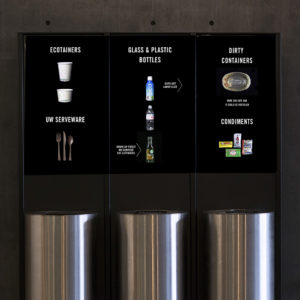
View Case Study
Smart Bins solve the always challenging problem of not knowing where to put your trash—does it go in compost, recycle or landfill?
Sorting garbage into compost, recycling or landfill can be a surprisingly difficult task. To help University of Washington students with this problem, the Smart Bins installation features separate receptacles, each fitted with a scale, a microcomputer and a digital screen.
When in use, the digital screens show how much money is saved by proper composting and recycling and the hypothetical campus-wide savings if everyone did the same; when not in use, the screens show correctly sorted trash items cascading into each bin.
For the 10 to 40 people per hour who have used Smart Bins since it launched at a UW campus café, throwing out garbage has become fun.
After installation, correct composting increased by 20 percent, and incorrect recycling decreased by 15 percent.
The project, originally a concept proposed by UW graduate students, took seven months to complete. The installation is powered by three Raspberry Pis programmed in Python.
- Why this project is worthy of a UX Award:
Every day, the average American produces 4.5 pounds of trash. More than 70% of that waste could be recycled or composted. However, many Americans don’t recycle or compost correctly. Approximately two-thirds of all recyclables and compostables end up in landfills, where they produce methane, a greenhouse gas 25 times more powerful than carbon dioxide. In the US, landfills are the third-largest source of methane emissions.
Why do people fail to compost and recycle? Research suggests that many individuals are apathetic toward these activities—proper waste disposal is simply not a priority. Others are willing to make the effort, but lack knowledge. To be fair, sorting waste can be complex and confusing.
How can we encourage greater participation in composting and recycling? At the University of Washington, a team of faculty, students and alumni developed “Smart Bins”—interactive trash cans that aim to make waste disposal beautiful, interesting and even pleasurable.
At a pilot installation of Smart Bins the university’s Garbology Project (http://uwgarbology.weebly.com) found that Smart Bins were remarkably successful: they increased composting by 20%, decreased recycling contamination by 15%, and decreased landfill by 5%.
Each Smart Bin is fitted with a scale, micro-computer and digital screen. When users throw away their waste, they see messages that explain the collective impact of their individual action. When the bins are not in use, the screens show a looping video of sorted items falling into the correct bins. The video includes playful stop-motion animations that demonstrate how to dispose of confusing items that are commonly misplaced. Please see http://vimeo.com/183034021.
- Submitted By: University of Washington
See More 2017 Submissions >>